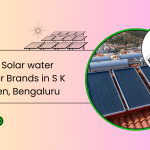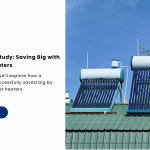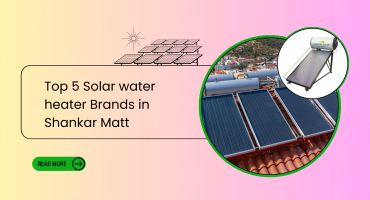
Varistor Solar is dedicated to empowering individuals, businesses, and communities with the transformative power of solar energy. We believe in a brighter, cleaner future and are committed to making sustainable living accessible to everyone.
+91-9113690456
Email: sales@varistorsolar.com
Varistor Solar
NO 40/C, KALKERE VILLAGE,12TH MAIN, NRI LAYOUT,Ramamurthy Nagar, Bangalore North,Bangalore- Karnataka, 560016
Introduction: Discovering the Marvels of Solar Water Heating
In the realm of sustainable living and energy efficiency, solar water heaters stand out as a beacon of innovation. Harnessing the abundant energy of the sun, these systems provide an eco-friendly solution to heating water for various household needs. But just how hot can a solar water heater get? Join us on a journey to unravel the mysteries of solar water heating systems and explore the factors that influence their temperature capabilities.

Understanding Solar Water Heaters: A Primer
Before delving into the intricacies of temperature levels, let's first grasp the basics of solar water heaters. These systems consist of solar panels, often mounted on rooftops or other suitable locations, which absorb sunlight and convert it into heat energy. This heat is then transferred to water stored in a tank or reservoir, providing a continuous supply of hot water for domestic use.
Exploring the Factors Influencing Temperature Levels
The temperature achieved by a solar water heater depends on several key factors, each playing a crucial role in determining its performance. Let's delve into these factors and understand how they influence the heating capabilities of solar water systems.
1. Solar Water Heater Design and Size
The design and size of a solar water heater greatly impact its ability to reach high temperatures. Larger systems with ample surface area for solar panels can absorb more sunlight, resulting in increased heat production. Additionally, the design of the solar collector and the efficiency of heat transfer mechanisms within the system contribute to overall performance.
2. Solar Irradiance and Geographic Location
The amount of sunlight available, often referred to as solar irradiance, varies depending on geographic location and environmental factors. Regions closer to the equator generally experience higher levels of solar radiation, leading to greater heat generation in solar water heaters. Factors such as weather patterns, cloud cover, and shading also influence solar irradiance levels and, consequently, the temperature output of solar water systems.
3. Seasonal Variations and Sun Angle
Seasonal changes and the angle of the sun relative to the solar panels play a significant role in determining heating efficiency. During the summer months when the sun is high in the sky and days are longer, solar water heaters tend to reach higher temperatures. In contrast, winter months with shorter days and lower sun angles may result in reduced heating capacity. Proper system orientation and tilt angles can optimize sun exposure throughout the year.
4. Efficiency of Heat Transfer Mechanisms
The efficiency of heat transfer mechanisms within the solar water heater system influences its ability to convert solar energy into heat. Components such as heat exchangers, circulation pumps, and insulation materials play crucial roles in maximizing heat transfer efficiency and maintaining hot water temperatures. Regular maintenance and proper installation are essential to ensure optimal performance.
5. Integration with Backup Heating Systems
Some solar water heaters are equipped with backup heating systems, such as electric or gas-powered elements, to supplement solar heat during periods of low sunlight or high hot water demand. These systems enhance reliability and ensure consistent hot water availability, especially in regions with variable weather conditions. However, the reliance on backup heating may affect the maximum temperature reached by the solar water heater.
How Hot Can a Solar Water Heater Get?
Given the multitude of factors influencing temperature levels, the maximum temperature achievable by a solar water heater can vary significantly. On average, solar water heaters can heat water to temperatures ranging from 120°F to 160°F (49°C to 71°C) under optimal conditions. However, in regions with abundant sunlight and efficient systems, temperatures exceeding 180°F (82°C) are not uncommon.
Conclusion: Embracing the Power of Solar Water Heating
In conclusion, solar water heaters offer a sustainable and efficient solution for meeting hot water needs while reducing reliance on conventional energy sources. By harnessing the power of sunlight, these systems can heat water to impressive temperatures, providing a renewable alternative to traditional heating methods. Whether you're considering investing in a solar water heater for your home or simply curious about their capabilities, understanding the factors influencing temperature levels is key to unlocking their full potential.
FREQUENTLY ASKED QUESTIONS
FREQUENTLY ASKED QUESTIONS
- Varistor Solar™ stands out as a premier choice for solar water heaters. With a dedication to innovation, quality, and sustainability, Varistor Solar™ ensures top-notch performance and reliability in its products.
- Varistor Solar™ boasts some of the most efficient solar water heaters on the market. Our cutting-edge technology maximizes energy capture and minimizes heat loss, ensuring optimal performance even in challenging conditions. With Varistor Solar™, you can enjoy superior efficiency and savings on your energy bills.
- When selecting a solar water heater, it's essential to consider factors like efficiency, durability, and reliability. Varistor Solar™ excels in all these aspects, offering a range of high-quality products designed to meet diverse needs. With Varistor Solar™, you can trust that you're investing in a superior solution backed by years of expertise and innovation.
- Varistor Solar™ offers a range of solar tanks designed to deliver exceptional performance and durability. Whether you need a compact tank for residential use or a larger tank for commercial applications, Varistor Solar™ has you covered. Our tanks are built to withstand harsh environmental conditions while maximizing energy capture, ensuring reliable hot water supply year-round.
- Varistor Solar™ stands as a leader in the solar industry, renowned for its commitment to excellence and customer satisfaction. With a focus on innovation and sustainability, Varistor Solar™ continually pushes the boundaries of what's possible in solar technology. When you choose Varistor Solar™, you're not just investing in a product – you're investing in a brighter, more sustainable future.
Now It's Your Turn:
Making the switch to solar water heaters in India is a smart and sustainable choice. The top brands like Varistor Solar™, Racold, Havells, V-Guard, and AO Smith offer reliable options to meet your hot water needs efficiently.
Among these, Varistor Solar™ stands out as the top choice in India, trusted by many. We provide a variety of solar water heaters, catering to different preferences and requirements. Our clients trust us for our quality and performance.
For more details about our solar water heaters, call us at 9113690456 or email sales@varistorsolar.com. Choose Varistor Solar™ for a greener and more energy-efficient future.
"WHAT YOU CAN READ NEXT"
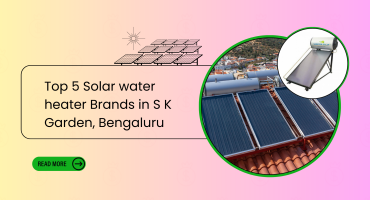 Read more +02 May 2025 in Solar Water Heater
Read more +02 May 2025 in Solar Water HeaterTop 5 Solar water heater Brands in S K Garden, Bengaluru
 Read more +02 May 2025 in Solar Water Heater
Read more +02 May 2025 in Solar Water HeaterHospital Case Study: Saving Big with Solar Water Heaters
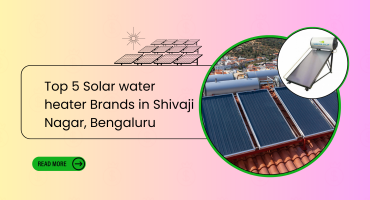 Read more +30 April 2025 in Solar Water Heater
Read more +30 April 2025 in Solar Water Heater
 Call or Text:
Call or Text: 